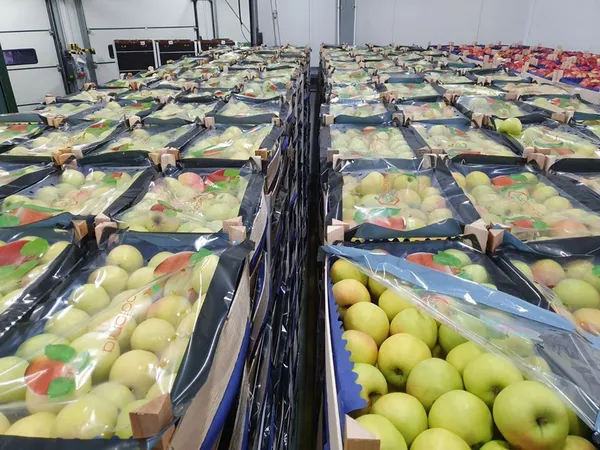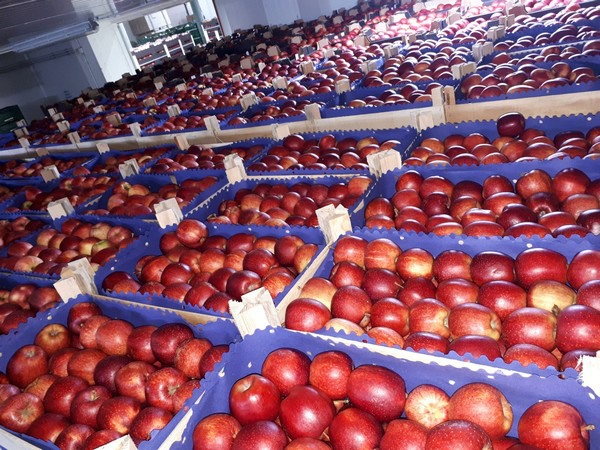The war in Ukraine has had big consequences for Poland as a country. 100,000 war refugees are crossing the Polish border every day, while Ukrainian male employees in Poland are making their way back to their home country to defend it. Naturally, the situation has brought difficulties for the export of apples as well.
Jakub Krawczyk, export manager for Polish apple exporter Appolonia, states Poland is doing what it can to help the Ukrainian people in this time of war: “As a community, we’re all involved in helping Ukrainian people with transportation, food, medical healthcare and organization of basic needs here in Poland. All Polish people are involved; private companies, governmental officials or just regular people, they are trying to do everything to help our neighbors in these hard wartimes.”

“The situation has a tremendous impact on apples sector as well. We have a few big problems; sales of apples are low, as there is a decrease in consumption of fruits and of course the increasing cost of energy, petrol and gas. There is a lack of qualified employees like truck, forklift and tractor drivers,” Krawczyk explains. “Eastern markets are closed for us right now. It’s been more than two months since the Belarus embargo started and it had a huge negative effect on apple sales in Poland. The Russian embargo is really bad for us, but the Belarus embargo is even worse, as Belarus was one of the biggest importers of our apples. This means that we all have less orders at the moment, and lot of companies are not working at full capacity, unlike how it was before the embargo.”
Overall, apple consumption seems to be down compared to the usual level, Krawczyk says: “We feel the decrease in consumption of apples on both the Polish domestic market as well as in the rest of Europe. Right now, stocks of apples in Western Europe are quite large and orders for Polish apples from this region are much lower than usual. To have a war just behind the European Union border has caused a significant increase in costs of petrol, and it’s obvious that those costs will have an effect on everything else.”

Because of the conflict in Ukraine, road transport to Kazakhstan or Mongolia is a hard thing to organize according to Krawczyk: “I would say it is almost impossible at this time. There are also fewer sales to Serbia. But the conflict has also caused a shift in the container sector, as availability for containers has dropped dramatically. Sales to Egypt has been much more difficult as a result and Egypt is a very big importer of Polish apples. There’s also been a new law in Egypt that is only allowing a Letter of Credit as a payment term, which has really slowed down orders to that region. A lack of containers also means less opportunities for sales to Asia and the Middle East.”
Normally the price of apples would increase this time of the year, as storing the apples increases the costs that exporters have. However, currently the price of apples has been decreasing, says Krawczyk. “Over the last few weeks, the price of apples in Poland have dropped down just a little bit, but normally in this stage of the season the prices should rise, because of the increasing costs of storage. In the last week, there hasn’t been any change in the price at all that we noticed. The cost of food is increasing due to the war, but the price of apples is not going up at the same level. We think the season will be hard, conflicts have blocked our sales, we face some difficulties with logistics and sometimes with payment conditions. Issues that are usually just a few bumps in the road, have now combined together with the war to create this negative situation. It’s not a guarantee the situation will remain this bad, but we need to monitor situation on every market to see how we can react.”
“I think Polish apples are a good option for importers, because there are lot of varieties they can choose, quality is still very good and we can provide very large quantities. Producers like us will be happy to start cooperation with new partners, and even though there are many problems that are accumulating we still want to move ahead to deliver healthy food on every table.” Krawczyk concludes.
For more information:
Jakub Krawczyk
Appolonia
Tel: +48 785 342 930
Email: [email protected]
www.appolonia.pl










